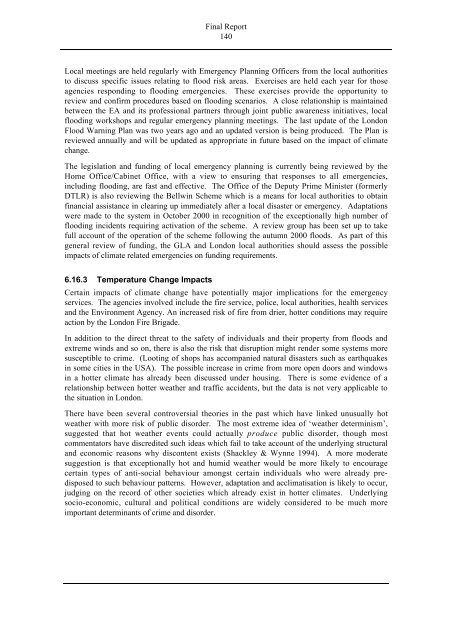London scoping - ukcip
London scoping - ukcip
London scoping - ukcip
Create successful ePaper yourself
Turn your PDF publications into a flip-book with our unique Google optimized e-Paper software.
Final Report<br />
140<br />
Local meetings are held regularly with Emergency Planning Officers from the local authorities<br />
to discuss specific issues relating to flood risk areas. Exercises are held each year for those<br />
agencies responding to flooding emergencies. These exercises provide the opportunity to<br />
review and confirm procedures based on flooding scenarios. A close relationship is maintained<br />
between the EA and its professional partners through joint public awareness initiatives, local<br />
flooding workshops and regular emergency planning meetings. The last update of the <strong>London</strong><br />
Flood Warning Plan was two years ago and an updated version is being produced. The Plan is<br />
reviewed annually and will be updated as appropriate in future based on the impact of climate<br />
change.<br />
The legislation and funding of local emergency planning is currently being reviewed by the<br />
Home Office/Cabinet Office, with a view to ensuring that responses to all emergencies,<br />
including flooding, are fast and effective. The Office of the Deputy Prime Minister (formerly<br />
DTLR) is also reviewing the Bellwin Scheme which is a means for local authorities to obtain<br />
financial assistance in clearing up immediately after a local disaster or emergency. Adaptations<br />
were made to the system in October 2000 in recognition of the exceptionally high number of<br />
flooding incidents requiring activation of the scheme. A review group has been set up to take<br />
full account of the operation of the scheme following the autumn 2000 floods. As part of this<br />
general review of funding, the GLA and <strong>London</strong> local authorities should assess the possible<br />
impacts of climate related emergencies on funding requirements.<br />
6.16.3 Temperature Change Impacts<br />
Certain impacts of climate change have potentially major implications for the emergency<br />
services. The agencies involved include the fire service, police, local authorities, health services<br />
and the Environment Agency. An increased risk of fire from drier, hotter conditions may require<br />
action by the <strong>London</strong> Fire Brigade.<br />
In addition to the direct threat to the safety of individuals and their property from floods and<br />
extreme winds and so on, there is also the risk that disruption might render some systems more<br />
susceptible to crime. (Looting of shops has accompanied natural disasters such as earthquakes<br />
in some cities in the USA). The possible increase in crime from more open doors and windows<br />
in a hotter climate has already been discussed under housing. There is some evidence of a<br />
relationship between hotter weather and traffic accidents, but the data is not very applicable to<br />
the situation in <strong>London</strong>.<br />
There have been several controversial theories in the past which have linked unusually hot<br />
weather with more risk of public disorder. The most extreme idea of ‘weather determinism’,<br />
suggested that hot weather events could actually produce public disorder, though most<br />
commentators have discredited such ideas which fail to take account of the underlying structural<br />
and economic reasons why discontent exists (Shackley & Wynne 1994). A more moderate<br />
suggestion is that exceptionally hot and humid weather would be more likely to encourage<br />
certain types of anti-social behaviour amongst certain individuals who were already predisposed<br />
to such behaviour patterns. However, adaptation and acclimatisation is likely to occur,<br />
judging on the record of other societies which already exist in hotter climates. Underlying<br />
socio-economic, cultural and political conditions are widely considered to be much more<br />
important determinants of crime and disorder.

















